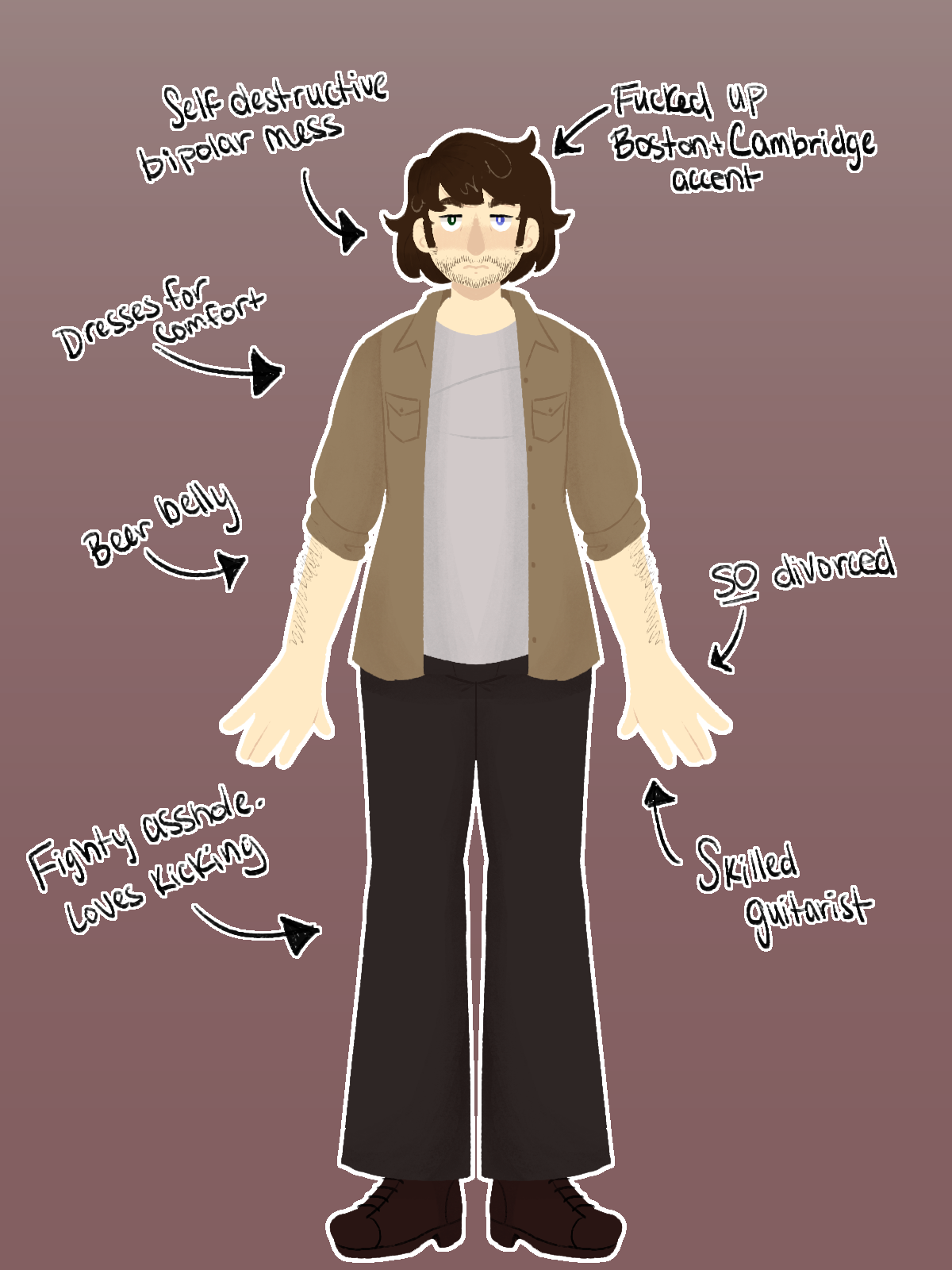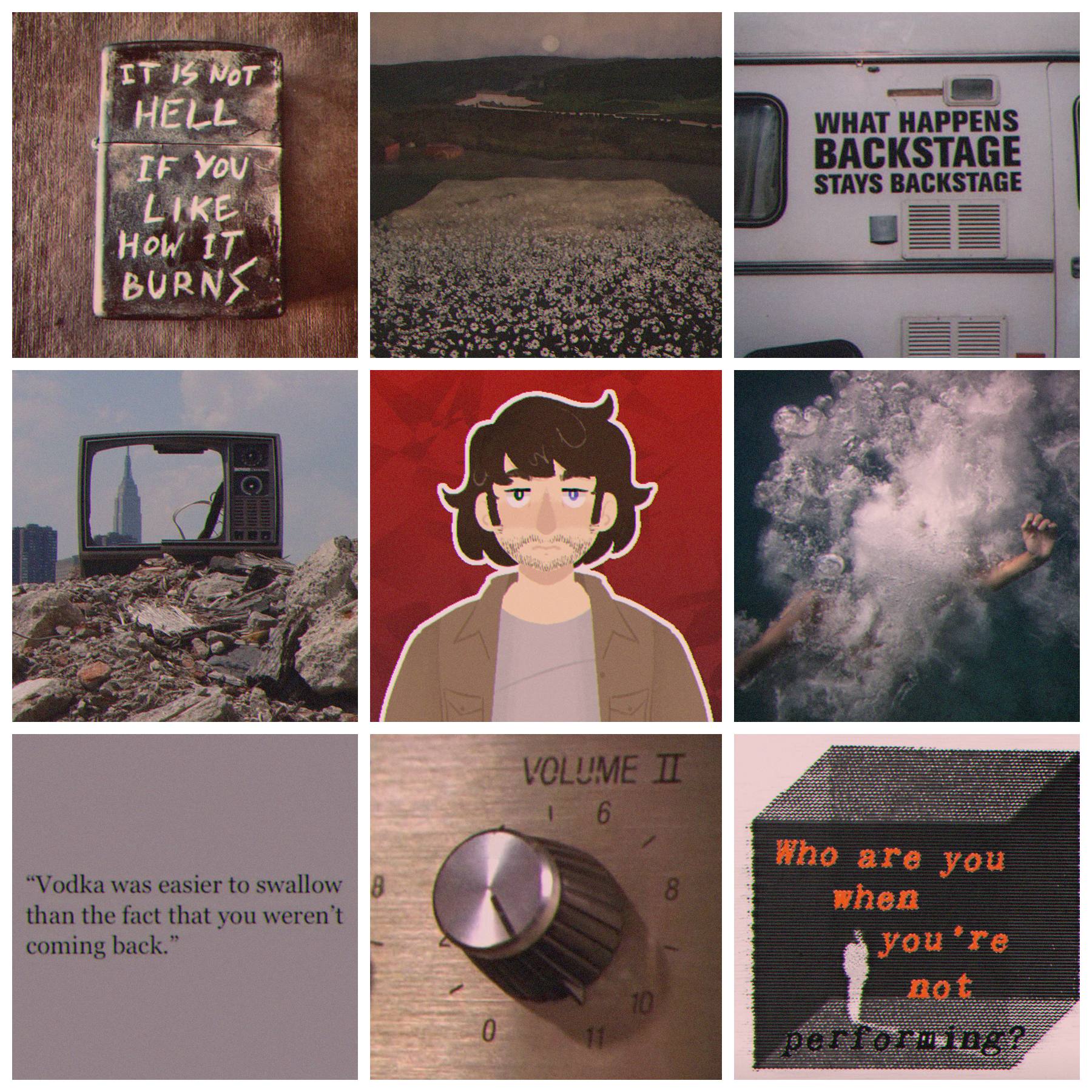Descriptors/Basic Info
Physical Description
Height: 5'11 / 180cm
Weight/Build: 180lb / 81.5kg; "husky" build with a definite beer gut as he ages
Species, Race: Human, Caucasian
Hair Color/Length/Type: Dark brown, varying length but usually no longer than his shoulders. Slightly wavy.
Eye Color: Left - Blue, Right - Green
Voice Claim, Range: Nicholas Kirk (singer for The Brothers Bright)
Typical Wardrobe: Dresses for comfort, not style. He isn't a slob, though. By the time the band is successful enough to dictate their own look, he's typically found in plain or graphic tee shirts, sometimes layered with light button downs, and slacks. Usually wearing well-work leather boots or sneakers. No accessories, sans a wedding ring... sometimes.
Other Characteristics
Likes:
- Good bourbon
- Crime novels and TV shows
- Home-cooked meals
- Birding
- Rainy afternoons
Dislikes:
- Vodka
- Scratchy fabrics
- Small talk
- Opera
- The weather in France, specifically (don't ask)
Philosophy: "Just do what you can with what you have, and get ahead as much as you can"
MBTI: ENFP (The Healer)
Odd Trivia
- His accent is a weird bastardization of Bostonian and Cambridge. It's way more evident when he speaks than when he sings.
- Had the most successful solo career out of everybody in the band, but gave it up after just a few albums due to the physical and emotional toll. Continued to produce and ghostwrite well into the 1990s.
- Once he was more retired from the music industry, he started a conservatory for birds of Appalachia.
- While undiagnosed until the late 1980s, he has bipolar depression. Up until he gets sober in the same decade, he heavily self-medicates with a variety of substances to... not great results.
- He's been married three times, and unsuccessful in all three marriages. Has been officially single since 1990 and is generally fine with this, choosing to spend more time outdoors and with his several grandchildren.
Natal Chart
| Sun ☼ | Virgo |
| Moon ☾ | Cancer |
| Mercury ☿ | Leo |
| Venus ♀ | Libra |
| Mars ♂ | Libra |
| Jupiter ♃ | Libra |
| Saturn ♄ | Leo |
| Uranus ♅ | Gemini |
| Neptune ♆ | Libra |
| Pluto ♇ | Leo |
| Lilith ⚸ | Sagittarius |
| Midheaven 🅪 | Taurus |
Biography
TW: Mentions of substance use, death of friends and family members, reproductive and emotional abuse, and suicidal ideation
Rob was born to generally little fanfare to his mother, Judith Eloise, and father, John William, during the height of Summer 1946. His family spent the first few years of his life living just outside Salem, Mass., before immigrating to Cambridge, England, where his father had been stationed during WWII. John had made many connections during his time there, and a lucrative job offer during the postwar reconstruction period as an architectural consultant made the decision easy; they completed their move in the late Autumn of 1950.
From there, he was able to grow up reasonably comfortably. Despite teasing from his classmates over his "odd" accent and mannerisms, he did well academically and socially. He didn't spend much time in America - sans a month-long trip in the Summer of 1957 to visit family while his maternal grandmother was dying - so developed a rather bastardized accent. He would develop a passion for music in the same way many in the era did, via pirate radio and the rare blues record. By the age of 12, he was a skilled guitarist and singer, hopping between a number of skiffle bands and halfway considering a career in music. Even so, he finished school normally and was accepted into the University of Cambridge in the Autumn of 1964 with an initial plan of studying English - then economics - then zoology.
Very quickly into his college career, in 1965, he was asked to join a small RnB band that had an ever-cycling slew of names and members; this would be among the earliest iterations of The Unconventional Desires, headed by Sydney Maples and Anthony "Buck" Wilder. Soon they were joined by a keyboardist, Nolan Sjöberg and began marketing themselves as Pincushion Four - chaged to The Unconventional Desires shortly after being joined by Benny Gilbert.
The band would find moderate success in their early years, and once they were signed in late 1966, Rob was able to begin solidifying himself as a songwriter and performer. Following the release of their first album in 1967, he would marry his long-time girlfriend Sandra Bush, but it wouldn't be a harmonious matrimony. Sandy was, in the kindest terms, emotionally distant, even by Rob's standards, and never seemed pleased with his achievements, musical or financial; she rarely returned his affections outside the purely physical. They would have one child - a daughter - together before divorcing in 1971.
As his wealth grew - and notoriety shooting through the roof in 1970 with the release of the album The Western Front, his mood swings would become more and more difficult to handle. Between this and sheer availability of nearly anything he wanted, he would develop a number of substance use habits, most notably marijuana, alcohol, and cocaine - the former to manage his intense upswings, and the latter two to manage the downswings. This, of course, was to little tangible success, and became a poorly-hidden secret. On two separate occasions between 1974 and 77, he would attempt stints in rehab due to more and more freqent blackouts, but would not fully become sober until the mid 1980s.
As the mid-70s rolled around, tensions would come to a head amongst the band for various reasons: his and Benny's substance use; the financial excesses of producer Richard Williams; arguments on songwriting credits and who would take credit for singles; the overall musical direction they wanted to take. In late 1975, Benny would be killed in a case of mistaken identity, and this hit Rob particularly hard, as he saw Benny as the little brother he never had. His impulsitivity and substance use would worsen; his highs would reach to the moon, and his lows would touch the Mariana Trench.
Following this, he would remarry to another long-time girlfriend Emily Glass, whom he had met on a UK tour in 1972. She would be a stark contrast to Sandy, and tended to be overbearing and borderline obsessively controlling over him. She would repeatedly sabotage her own birth control, giving birth to twin boys and a daughter within eighteen months of each other. Following their 1979 divorce, she would estrange herself and their children from him, and reconciliation would be difficult. He would not have a full relationship with his youngest three children until the late 1980s.
With his divorce, release of his final solo album, and breakup of the band within the same year, Rob would emotionally drift for some time. He had little financial need to pursue further creative projects, having solidified himself a lucrative contract with residuals, and did little in the way of music for several years. For what it was worth, the lack of stressors in his life would distinctly reduce his impulse to drink and he flirted with sobriety for the next several years. Eventually, he would find work as a session guitarist and ghostwriter for several acts and was comfortable with himself.
In 1982 he would marry Scottish model Christine Jones in a quiet, intimate ceremony, and the couple would spend the next eight years in relative bliss. This by far is the most healthy relationship he would curate; Christine would encourage his final stint in rehab where he would find complete sobriety and a diagnosis for his long-untreated bipolar depression. With appropriate treatment, he was able to come to terms with himself, rekindle his relationship with his children, and apologize to the people around him - and himself - for the many years of turmoil. The pair would divorce at the tail end of 1990, although it was due to a mutual understanding that they had different wants and expectations for their future rather than bad blood; the two have remained friends since, and she maintains an active role in the lives of her stepchildren.
Now approaching his fifties, Rob would move back to the United States, establishing a wildlife sanctuary in the foothills of West Virginia. Beginning in the mid-1990s, he would aggressively push conservation efforts in the Appalachian region with an emphasis on birds - he had been a major proponent in the United States ban of DDT in 1972 - and fund education efforts where possible.
Now, in his older years, he continues his conservation efforts in a pseudo-retirement. Musically speaking, he does little of note, but has been known to occasionally write for other musicians and sporadically contributes as a session guitarist. He spends most of his time out in nature, often with his grandchildren, finally at peace with himself.
Other Junk
Gallery

